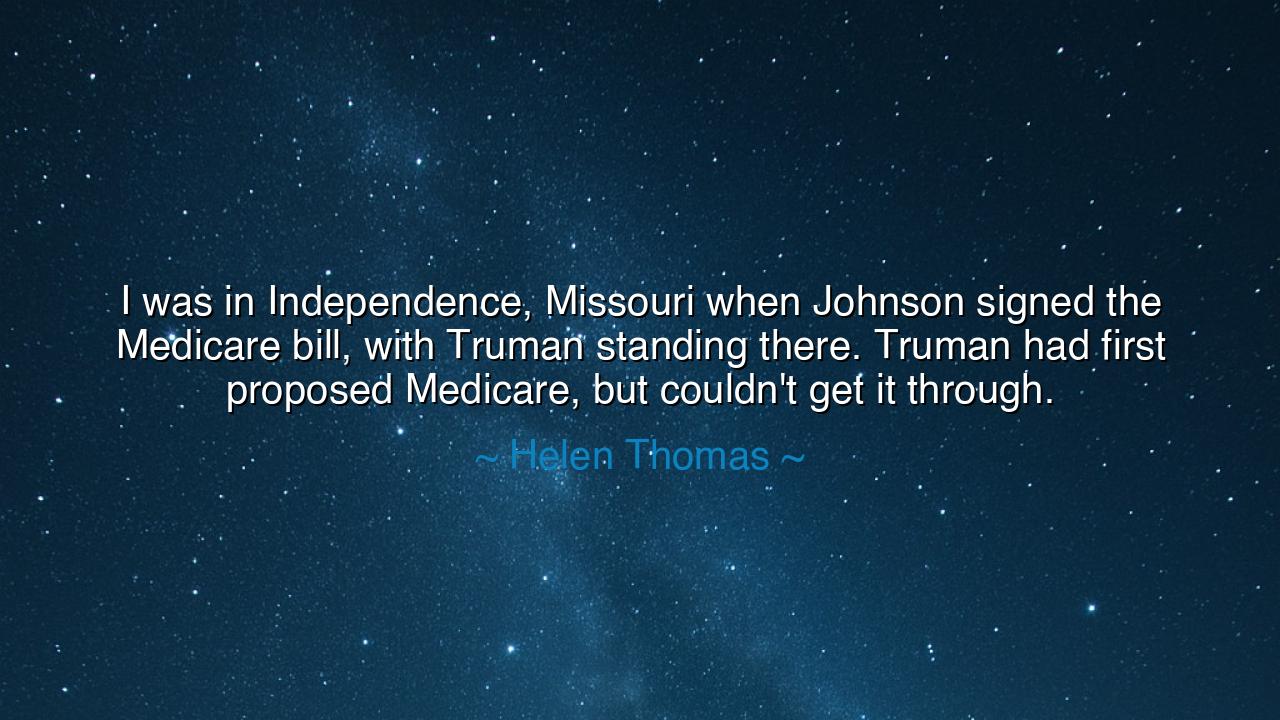
I was in Independence, Missouri when Johnson signed the Medicare
I was in Independence, Missouri when Johnson signed the Medicare bill, with Truman standing there. Truman had first proposed Medicare, but couldn't get it through.






“I was in Independence, Missouri when Johnson signed the Medicare bill, with Truman standing there. Truman had first proposed Medicare, but couldn’t get it through.” Thus spoke Helen Thomas, the indomitable White House correspondent who bore witness to generations of power and change. Her words are more than a memory; they are a meditation on the persistence of vision, the endurance of ideas, and the way in which the labors of one age become the triumphs of another. In this moment she recalls not merely a ceremony, but a turning of the wheel of history — a torch passed from one leader to another, from Harry S. Truman, the visionary, to Lyndon B. Johnson, the fulfiller of that vision.
In the quiet city of Independence, Missouri, on July 30, 1965, President Lyndon B. Johnson signed into law the Medicare Act, granting older Americans access to health care through the strength of their government rather than the uncertainty of charity. Beside him sat Harry Truman, now aged and frail, who had first planted the seed of this idea nearly two decades before. Truman had dreamed of a system that would protect citizens from the ruinous cost of illness — but his time was one of opposition and suspicion, and his proposal for national health insurance was defeated by powerful voices who feared it as “socialized medicine.” Yet Truman, though beaten, did not abandon hope. He spoke of a day when his nation would remember its duty to the weak and the old, and in that faith he sowed the seed that would one day bloom.
And so, when Johnson invited him to stand at his side in Independence, it was not merely as a guest of honor, but as a prophet vindicated. It was as if the past itself had returned to witness the harvest of its own labors. The pen that signed the bill did not belong to one man alone — it belonged to every generation that had fought for compassion over indifference. Helen Thomas, present among them, saw with her own eyes that sacred exchange — the completion of an unfinished promise, the triumph of perseverance over the stubbornness of time.
To understand the depth of this moment, one must recall the nature of Truman’s courage. He was not a man born to privilege or prestige, but one shaped by the plain virtues of the Midwest — honesty, work, and duty. When he spoke of justice, it was not as an idealist but as a realist who had seen hardship. His call for universal health care came not from ideology, but from empathy. Yet the tides of his time were against him. The world was fresh from war, haunted by the specter of communism, and unwilling to hear the word “universal” without suspicion. Still, Truman spoke the truth, even when none wished to listen — for he knew that right ideas, though rejected, never die.
This is the wisdom Helen Thomas gives us through her remembrance: that progress is rarely born in victory, but in persistence. The Medicare Act was not a sudden miracle, but the fruit of two decades of struggle. What one leader began, another completed. And in this we see a great lesson — that no good cause is wasted, even when it fails. Every generation builds upon the faith of the last, each carrying forward the work of justice as runners in a relay of time. Truman’s defeat was not the end of his dream; it was merely the beginning of a longer journey, one that would culminate, years later, beneath the bright lights of Independence, Missouri.
Such patterns are the rhythm of history. In every age, visionaries rise who dream beyond their day — only to be opposed, misunderstood, or ignored. Yet, as with Truman, their visions endure through those who follow. Abraham Lincoln did not live to see the healing of the Union he preserved, yet his cause triumphed in the peace that followed. Susan B. Anthony died before women won the right to vote, yet her struggle lit the path for those who would finish her work. So too did Truman’s dream live beyond him, carried by a nation that slowly learned to see what he had already seen.
Let this be the lesson we take from Helen Thomas’s recollection: that patience and perseverance are the guardians of all great change. One generation may plant, and another may harvest — but both are bound in the same sacred labor. Do not despair when your efforts seem fruitless, for the truth you fight for may not bloom until long after you are gone. Yet bloom it shall, if it is rooted in justice.
And so, my child, remember this: greatness is not only in the one who achieves, but in the one who begins. Truman dreamed, Johnson fulfilled, and Thomas remembered — three witnesses to the eternal march of progress. The torch you hold today was lit by others before you; carry it forward, not for glory, but for duty. For the work of civilization is endless, and each of us, like Truman, must plant seeds we may never see grow — trusting that the light of independence, once kindled, will guide generations yet unborn.






AAdministratorAdministrator
Welcome, honored guests. Please leave a comment, we will respond soon